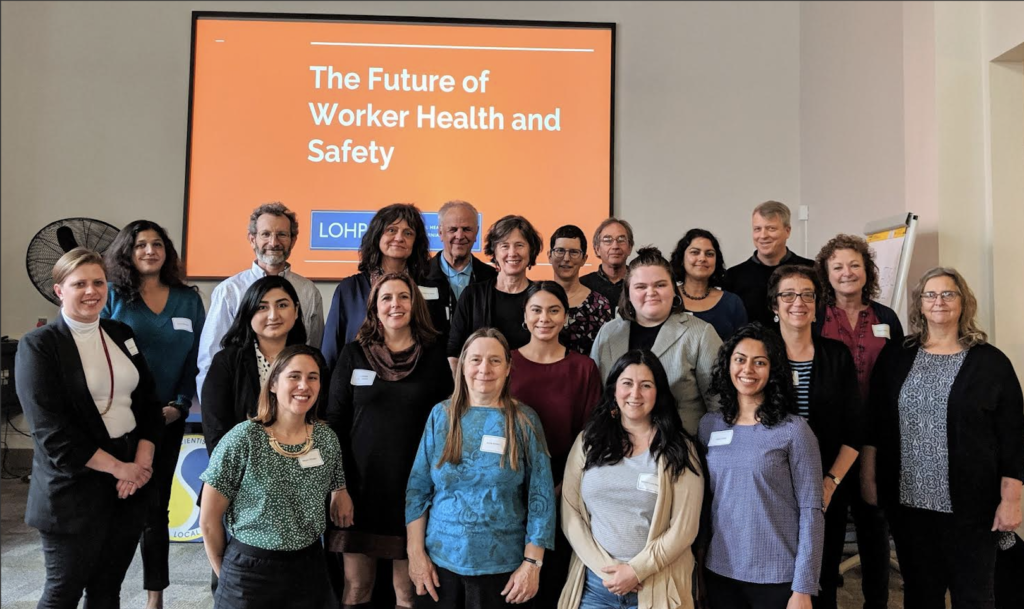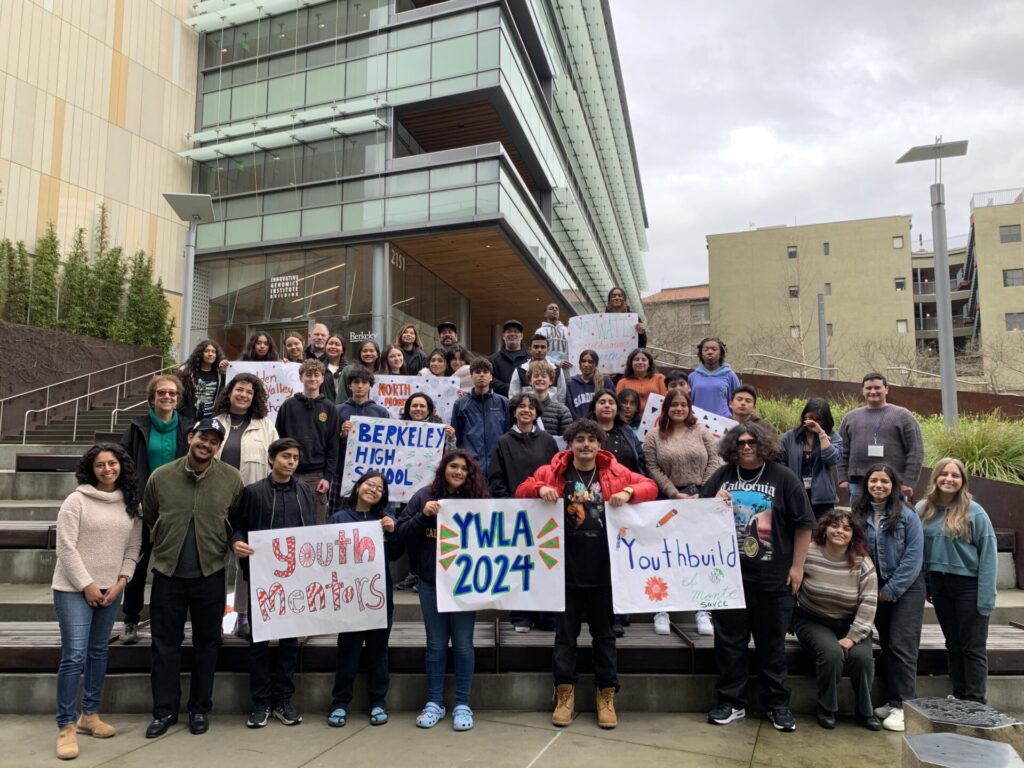COVID-19
Since the pandemic began, much of our work has been centered on efforts to protect worker’s health and advocate for stronger protections. LOHP has collaborated with many partners and worker organizations to carry out training in English and Spanish, addressing COVID-19 risks and protective measures, the emergency Cal/OSHA standards, workers’ rights, and taking action to resolve problems.
LOHP has been part of the statewide California COVID-19 Workplace Outreach Project organized and funded by the CA Labor and Workforce Development Agency. We developed many resources and tools that were disseminated statewide and carried out capacity building training with a focus on the high-risk industries of grocery, retail, and food processing, and on reaching community and worker organizations. We recently launched a new web-based resource for worker organizations and workers to learn about the range of options for resolving problems at work: Taking Action to Address Safety and Health During the COVID-19 Pandemic. This features five stories of workers and organizations that engaged in efforts to address COVID-19 hazards, with each story including a time of key events, videos describing specific strategies used, and helpful resources.
Currently, we have a training program focused on reaching workers in the grocery and food sector, home care, residential care, day laborers, and small business employers. We have integrated COVID-19 into our core training programs with WOSH specialists and school employees, and have also trained workers in many industries on other job hazards linked to the pandemic, including chemicals, stress, and workplace violence. We collaborated on research to document workers’ experiences – focused on grocery store workers and Asian and Latinx low-wage workers in restaurants, home health care, janitorial – and we participate in statewide coalitions to raise awareness of the pandemic’s impact on workers and advocate for needed benefits, strong protections, and workers’ rights.
To find out more, contact: Suzanne Teran – steran@berkeley.edu, Alejandra Domenzain – alejandra.domenzain@berkeley.edu, or Laura Stock – lstock@berkeley.edu.
FUTURE OF WORK

The nature of work is changing rapidly. There are more and more workers who face challenges related to insecure employment, inconsistent hours, and lack of livable wages, health insurance, and other benefits. Workers are also facing new hazards on the job associated with an increased work pace, increased workplace monitoring, and new technologies.
LOHP has been advocating to include workers’ mental and physical health and well-being in any discussions about job quality for the future. We presented testimony to California’s Future of Work Commission, highlighting areas of particular concern for health and safety, as well recommendations to address conditions for immigrant workers. We are working on developing a “healthy job quality index” and exploring possible metrics to assess jobs with a Healthy Jobs framework in mind.
For the past several years, we have also had a focus on contingent workers, recognizing the need to confront the impact of increasingly fissured workplaces due to growth in sub-contracting, franchises, staffing agencies, independent contractors, and the “gig” economy. In part, this has involved an emphasis on temporary workers, who have higher rates of workplace injuries than non-temporary workers and are less likely than permanent workers to receive health and safety training or safety equipment. In partnership with Cal/OSHA Consultation Service, LOHP has been delivering training programs for staffing companies that describe their responsibilities as well as those of the host employers for protecting temporary employees.
To find out more, contact: Laura Stock – lstock@berkeley.edu.
WILDFIRES AND CLIMATE CHANGE
LOHP has had a focus on disaster preparedness for many years, and has been conducting training in Spanish-speaking communities living near refineries. In response to the devastating wildfires in CA, we are involved in multiple efforts to provide training and resources to outdoor workers.
This includes a current partnership with California Rural Legal Assistance (CRLA) Inc. and CRLA Foundation to train farmworkers on wildfire smoke hazards, worker protections, and the new Cal/OSHA emergency standard. After the 2017 fires in the North Bay, which highlighted gaps in information, support, and language-access for Latino communities during emergency response efforts, we organized a community roundtable for promotoras, health care providers, and community leaders, in collaboration with the state and local resource agencies. We also worked with the California Domestic Worker Coalition and Hand-In-Hand to produce tips for household employers.
We recognize the broader impacts of climate change on workers’ health, and that transitioning to a climate-safe, low-carbon economy will involve major changes in how we produce and use energy and other resources, how we live, and how we work. Many of these changes will result from policies to create jobs in the green economy and reduce greenhouse gas emissions. LOHP partnered with the UC Berkeley Labor Center and the California Labor Federation to develop a training for union leaders, designed to engage them in talking about how climate change is a labor issue, the opportunities and challenges it poses, and the different ways labor can play a role in addressing it.
To find out more, contact: Suzanne Teran – steran@berkeley.edu.
WORKFORCE DEVELOPMENT
LOHP works to support high road occupational safety and health training and preparation as part of workforce development programs. The mission of these programs, and in particular apprenticeship and pre-apprenticeship programs, is to help get workers into high-quality jobs and careers and to help employers hire and retain skilled workers. An essential component of a high-quality job is a safe and healthy work environment. That means that an essential component of new workers’ training is learning to recognize potential health and safety hazards, understanding employer responsibilities and employee rights, and knowing how to participate effectively in their employer’s health and safety program.
Most recently, LOHP has partnered with UC Berkeley’s Labor Center and the state’s High Road Training Partnership (HRTP) initiative to provide guidance and training resources to High Road Training Partnerships throughout the state. These webpages can help workforce development programs assess and strengthen their health and safety training and approach, with links to LOHP’s Workforce Development resources, including teaching materials in English and Spanish, as well as other tools and resources.
YOUNG WORKERS

Young workers aged 14 – 24 are injured on the job at higher rates than older workers, and typically work in low-wage, high-turnover jobs with unpredictable schedules and limited training and support. Those under 18 have special protections, but these are currently threatened by efforts to repeal child labor laws.
For over 25 years, LOHP has led education and policy efforts to protect the health and safety of young workers. We coordinate the California Partnership for Young Worker Health and Safety, bringing together state agencies and other organizations to advance joint efforts such as Safe Jobs for Youth Month. Each year, we organize a public awareness campaign in May, providing resources and teaching activities to reach high school students before they begin working over the summer. We are excited that this model will be expanded through AB800, which requires California public high schools to teach students about their rights at work during Workplace Readiness Week in the first week of May. Our 2023 Safe Jobs for Youth Month Resource Kit focused on highlighting the dangers of repealing child labor laws and recent investigations into illegal child labor practices among immigrant youth.
We also host the annual 3-day Young Worker Leadership Academy (YWLA), bringing together teams of youth with the goal of building youth leaders and advocates for safe jobs. We are now partnering with the California Department of Education to train teachers and equip them with resources to teach youth about workers’ rights and safe jobs. Through our work, we aim both to protect young workers on their jobs today and to help them develop job and life skills that they will use throughout their lives. Our resources for youth, employers, parents or family, teachers, and others are found on youngworkers.org.
To find out more, contact: Yasin Khan – ykhan@berkeley.edu or Hestia Rojas – hestiaro@berkeley.edu



